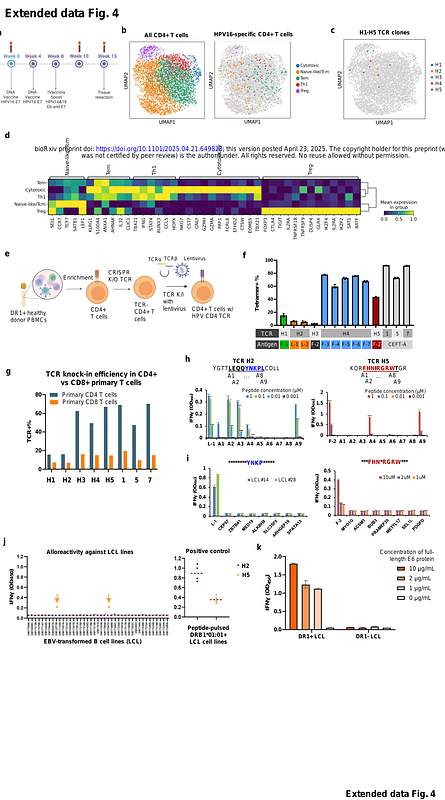Whole-Proteome Screening and Multi-Modal Profiling of Antigen-Specific CD4+ T Cells at Single-Cell Resolution

Whole-Proteome Screening and Multi-Modal Profiling of Antigen-Specific CD4+ T Cells at Single-Cell Resolution
Zhang, R.; Qi, J.; McKasson, M.; Choi, J.; Gutierrez, V.; Brennan, C.; Hong, S.; Chour, W.; Ng, R. H.; Xie, J.; Yuan, D.; Webster, A.; Sidhu, S. K.; Anderson, A.; Chen, D.; Edmark, R.; Murray, K. M.; Li, S.; McDonald, C.; Rowen, L.; Wang, S.; Rasheed, Y.; Su, Y.; Wagner, J. R.; Chen, J.; Narwaly, K.; Fu, J.; Duven, A.; Forman, S. J.; Song, M.; Priceman, S.; Brown, C. E.; Ribas, A.; Wong, D.; Paulson, K. G.; Drescher, C. W.; Puig-Saus, C.; Goldman, J. D.; Trimble, C. L.; Heath, J. R.
AbstractSystematic whole-proteome screening and comprehensive profiling of antigen-specific CD4+ T cells are crucial for advancing our understanding of CD4+ T cell immunity, yet such efforts remain technically challenging. Here, we present a high-throughput platform that employs large-scale class II single-chain trimer libraries to detect antigen-specific CD4+ T cells, while simultaneously profiling their antigen specificity, TCR/{beta} sequences, MHC restriction, whole transcriptomes, and patient/timepoint origins at single-cell resolution. We benchmarked SCTs against conventional pMHCs and validated the SCT library-based approach in direct ex vivo identification of antigen-specific CD4+ T cells in healthy donors. We then applied the platform to screen the entire SARS-CoV-2 receptor-binding domain in a longitudinal patient cohort, identifying 2,188 antigen-specific CD4+ T cells and revealing key features that define antigen immunogenicity. Extending to cancer, we performed whole-proteome screening of HPV-16 E6/E7 for TCR repertoire profiling in a precancerous cohort, uncovering functional heterogeneity of HPV-specific TCRs. By integrating high-throughput antigen screening with high-dimensional, multi-modal cellular characterization, our approach offers an unprecedented window into CD4+ T cell immunity across diverse disease contexts and empowers the development of new therapies.